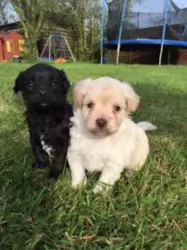 MyDogBreeds
MyDogBreeds Chipoo is originated from United States but Labrador Retriever is originated from Canada. Chipoo may grow 24 cm / 9 inches shorter than Labrador Retriever. Chipoo may weigh 27 kg / 59 pounds lesser than Labrador Retriever. Both Chipoo and Labrador Retriever has almost same life span. Chipoo may have less litter size than Labrador Retriever. Both Chipoo and Labrador Retriever requires Low maintenance.
Chipoo is originated from United States but Labrador Retriever is originated from Canada. Chipoo may grow 24 cm / 9 inches shorter than Labrador Retriever. Chipoo may weigh 27 kg / 59 pounds lesser than Labrador Retriever. Both Chipoo and Labrador Retriever has almost same life span. Chipoo may have less litter size than Labrador Retriever. Both Chipoo and Labrador Retriever requires Low maintenance.
 The Chipoo is not a purebred dog but rather a cross between the Toy Poodle and the Chihuahua. In the 1970’s the two breeds were crossed and the Chipoo was born. Chihuahuas have their origin in Mexico while the poodle is believed to come from Germany. This hybrid dog, because he comes form two purebred dogs is considered to be a designer dog. The Chipoo is not of course a purebred dog and is not recognized by the American kennel Club (AKC), but it is recognized by the designer groups and hybrid groups. These organizations include the International Designer Canine Registry, the American Canine Hybrid Club, the Designer Breed Registry, and the Designer Dogs Kennel Club.
The Chipoo is not a purebred dog but rather a cross between the Toy Poodle and the Chihuahua. In the 1970’s the two breeds were crossed and the Chipoo was born. Chihuahuas have their origin in Mexico while the poodle is believed to come from Germany. This hybrid dog, because he comes form two purebred dogs is considered to be a designer dog. The Chipoo is not of course a purebred dog and is not recognized by the American kennel Club (AKC), but it is recognized by the designer groups and hybrid groups. These organizations include the International Designer Canine Registry, the American Canine Hybrid Club, the Designer Breed Registry, and the Designer Dogs Kennel Club.
 The Labrador Retriever has its origin from Newfoundland which is an island.Dorset Eskimos are the people who settled down first in Newfoundland. Newfoundland was discovered in 1494 by the Bristol traders from England. The people in the Newfoundland used Lab to help them during fishing.They were recognized as a kennel club breed in England.
The Labrador Retriever has its origin from Newfoundland which is an island.Dorset Eskimos are the people who settled down first in Newfoundland. Newfoundland was discovered in 1494 by the Bristol traders from England. The people in the Newfoundland used Lab to help them during fishing.They were recognized as a kennel club breed in England.
The Lab has its special talents in fishing, it nicely holds the fish in its mouth and swims well to bring it to the fisherman who was its master. They are also used to hunt game birds and waterfowl.
 The Chipoo varies greatly in looks depending upon which breed it got most of its characteristics from. It is a toy dog, but it can have a curly coat or a straight one. It can be fluffy or wiry. It can be just about any color. All of them have Chihuahua tails but again depending on the mix, they can look like poodles or they can look like chihuahuas. They can vary in size from a very small toy to a larger sized small dog. You can have two Chipoos from the same litter and they will not be recognizable as littermates. However, they will all be adorable.
The Chipoo varies greatly in looks depending upon which breed it got most of its characteristics from. It is a toy dog, but it can have a curly coat or a straight one. It can be fluffy or wiry. It can be just about any color. All of them have Chihuahua tails but again depending on the mix, they can look like poodles or they can look like chihuahuas. They can vary in size from a very small toy to a larger sized small dog. You can have two Chipoos from the same litter and they will not be recognizable as littermates. However, they will all be adorable.
 Lab is a nice companion and also it helps in doing several works if it is trained. Lab is the America's most popular breed. They help the hunters, works with police and also serves physically challenged people. They are very friendly and it helps people so much by doing many works. They have very good sensitivity and are so affectionate with family members.
Lab is a nice companion and also it helps in doing several works if it is trained. Lab is the America's most popular breed. They help the hunters, works with police and also serves physically challenged people. They are very friendly and it helps people so much by doing many works. They have very good sensitivity and are so affectionate with family members.
They have very high energy level in their young stage. The Lab is a muscular and athletic dog. They are sweet natured and well deserved. Lab needs physical and mental activities regularly as they are very intelligent and energetic. The pure bred Labs have black, chocolate and yellow colours. They are very interested in hunting and roaming. The young Lab should be given training to swim as a child, as they likes it very much. They takes more time to mature hence remaining as teenager for a long time when compared with other breeds.
 This is a friendly dog and a great family member. They love to play and are easy to train. He does like to bark and makes a good guard dog. Get him a lot of toys for smart dogs. He is loyal and affectionate. You can carry him around all day if you want.
This is a friendly dog and a great family member. They love to play and are easy to train. He does like to bark and makes a good guard dog. Get him a lot of toys for smart dogs. He is loyal and affectionate. You can carry him around all day if you want.
 The Lab has a very good adaptability, it will get adjusted with its environment.
The Lab has a very good adaptability, it will get adjusted with its environment.
Lab has a good learning ability and it can learn upto 300 human phrases. They are the 7th most intelligent dog breed.
They are very much interested in playing with kids and are a very good companion for them.
 Hybrid dogs often do better health wise than the original parents, but this is not true of 2nd and third generation crosses. However, this is not generally true of the Chipoo, as they are no longer bred poodle to chihuahua but rather Chipoo to Chipoo. They are basically healthy but face some issues such as:
Hybrid dogs often do better health wise than the original parents, but this is not true of 2nd and third generation crosses. However, this is not generally true of the Chipoo, as they are no longer bred poodle to chihuahua but rather Chipoo to Chipoo. They are basically healthy but face some issues such as:
This is what causes the tear stains on most small light-colored dogs. This is called Epiphora and is not an irritation in the eye, just overly active glands.
This is low blood sugar and can cause all kinds of problems for your Chipoo. This can be fatal if not cared for. It has many causes if the dog is not diabetic including Xylitol (sugar free gum and other) parasites, stress, diarrhea or bacteria.
This loose knee cap condition is found in many small breeds and can lead to arthritis and lameness.
 Malformation of hips, knees and elbow, Chances for Cancer.
Malformation of hips, knees and elbow, Chances for Cancer.
 Because they are prone to hypoglycemia, make sure you feed a high quality dry food and break it up into three or four small meals a day in order to maintain the blood sugar and avoid the drops and spikes that can cause them serious health issues.
Because they are prone to hypoglycemia, make sure you feed a high quality dry food and break it up into three or four small meals a day in order to maintain the blood sugar and avoid the drops and spikes that can cause them serious health issues.
This is common in the Chipoo and it makes it hard for the dog to absorb things through the skin such as topical ointments for ticks and flea prevention.
If the outside temperature is less than 50’, then your Chipoo needs to wear a sweater as they get cold very easily.
The Chipoo is an energetic little dog and he loves to go on walks, play in the yard and be with the family. Both the Chihuahua and the Poodle are very intelligent dogs and so this cross gets bored and destructive if not stimulated enough. He’ll be great at agility and obedience. Like the poodle you can teach him a lot of tricks.
 The 2 month old puppy should be given 200 to 250gms of food. 3 month old puppy should be given 250 to 300gms of food and 6 months older should be given 350 to 450gms. The varieties of food which are popular is kibbles, Barf, wet food and Home cooked puppy food.
The 2 month old puppy should be given 200 to 250gms of food. 3 month old puppy should be given 250 to 300gms of food and 6 months older should be given 350 to 450gms. The varieties of food which are popular is kibbles, Barf, wet food and Home cooked puppy food.
Lab can be fed by dry kibbles and also by raw meat or bones. Now-a-days most of the Lab are being fed with kibbles. Kibbles are the dried pellets of dog food that can be bought in pet shop or even online. Raw meat and bones are very much popular food among dog owners in UK.
For good health, Lab should be fed by a diet controlled food. Because overfeeding will lead to overweight of the dog as it causes weakness of bones.
Lab is a very energetic dog, so it should be given some time to play daily. It will be very happy if it is given a fenced ground to play and burn off his natural energy. Also it will be very good for lab if it is given chance to swim weekly once.